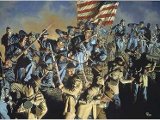King Cotton Diplomacy - Its Objectives and Reasons for Failure

On the eve of the American Civil War, the North had a major advantage over South in population, material resources and logistic. The Confederacy had several advantages as well, in the first place geographical factors because it was fighting a defensive war on its own territory and a rich military tradition. However, the Southern leaders were aware that the outcome of the war against the North was uncertain without a foreign aid or military intervention. And they had a powerful tool – cotton which was vital for the British and French economy.
The so-called King Cotton diplomacy that based on embargo of cotton export to Europe seemed to have good potentials to succeed. The Southerners had heard about dependency of the British and French economy on the white fiber from America for years and assumed that Britain and France cannot afford to be cut off from supply of cotton from the Confederacy. They believed that British and French textile industries would collapse without cotton from the Confederate states, while the rise of unemployment would cause serious social and political unrest. The King Cotton diplomacy therefore expected that the European powers will try to prevent a potential cotton famine by all means including recognition of Confederacy’s independence, providing support to the South in money and arms, and possibly even military intervention against the North.
The Southerners were so convinced in the success of the King Cotton diplomacy that they decided to keep cotton at their warehouses rather than trying to break through the naval blockade imposed by the North in April 1861 in order to show the British and French that their source of wealth depends on cotton from the South. At the same time the President of the Confederate States of America, Jefferson Davis sent emissaries in Europe and the neighboring countries to gain diplomatic recognition. However, the Confederate diplomats failed to win the European and Central American statesmen for the Southern cause, while the voluntary embargo on cotton did not achieved its objectives either.
At the outbreak of the American Civil War, Europe had a surplus of cotton and by the time it started running out it had successfully replaced the American cotton by cotton from India and Egypt. In addition, both France and Britain had strong economic interests in the North as well, while poor harvests in 1861 and 1862 made the King Corn by far more important than King Cotton. At the same time an eventual European intervention in the war was successfully prevented by Lincoln and the Secretary of State, William H. Seward by creating an impression that any support to the South will be regarded as declaration of war on the Union. Neither Britain nor France wanted to get involved in the war in America. Even more, both preferred status quo which was advocated by the Union.
By 1862, the King Cotton diplomacy proved to be a failure and the Confederate states were forced to lift self-embargo on cotton to finance the war. However, Lincoln meanwhile managed to establish an effective naval blockade stopping 95% of import and export to the Confederacy. An effective naval blockade did not only make it difficult to get the white fiber to Europe but also inflicted a heavy blow to the Southern economy as well as the Confederate forces by blocking import of heavily needed munitions. Failure of the King Cotton diplomacy turned out to be one of the main causes of Confederate defeat in the American Civil War.




